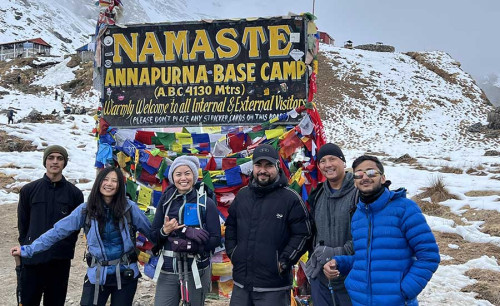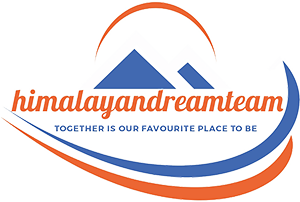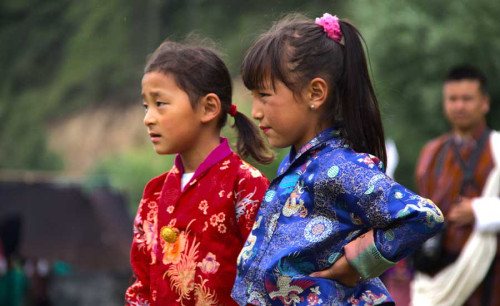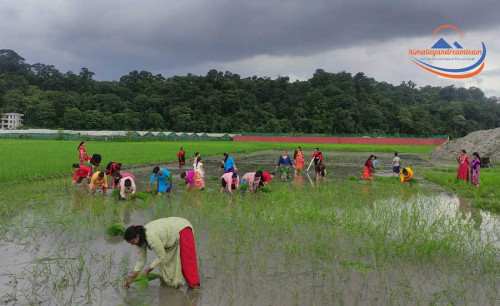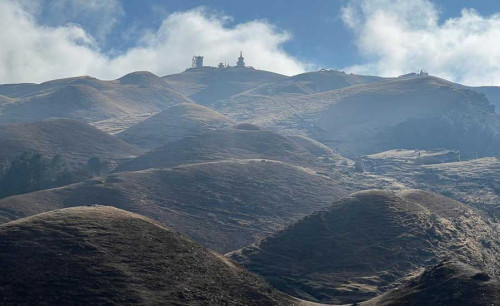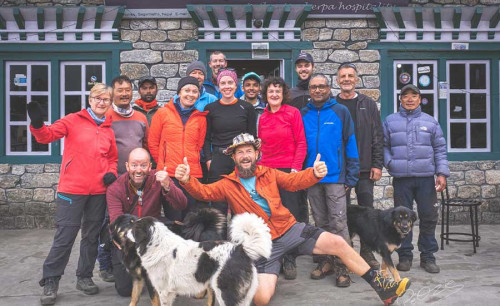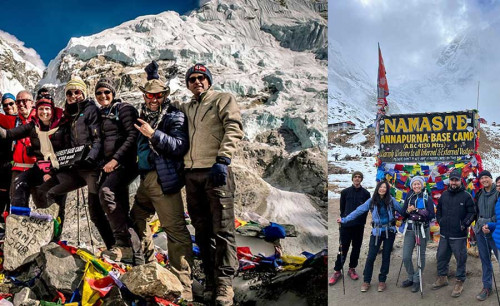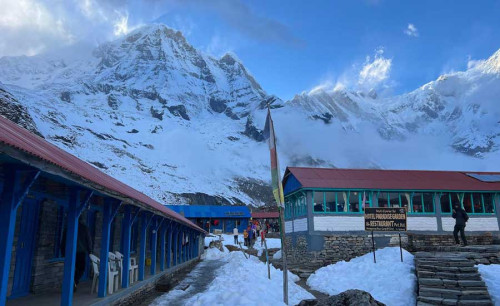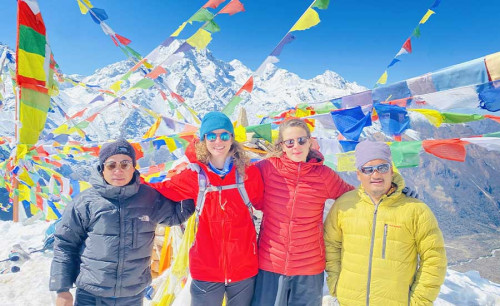Langtang Valley Trek Difficulty
Published On : 7th Oct, 2025 By Himalayan Dream Team

Langtang Valley Trek Difficulty: What to Expect and How to Prepare
Prayer flags blow in the wind and snow-capped mountains tower in the distance as nature, in all its floral beauty, embraces the langtang valley. frosted glacier rivers dance through the valley, weaving between alpine forests and mountain villages.Yes, this is langtang valley located in nepal, often referred to as valley of glaciers. Langtang valley is an unspoiled beauty in the himalayas encompassed with peace and mesmerizing adventures.
The valley is popular among both novice as well as seasoned trekkers. Everyone can experience the delight of the breathtaking landscape, ancient Buddhist monasteries and favorable Tamang heritage which make the Valley of Glaciers a hidden treasure. This trek is known as Langtang Valley Trek. It is a wonderful adventure and the perfect place to enjoy nature.
Like any adventure, there are both pleasant and distressing experiences. It is crucial to prepare accordingly by knowing what gear to pack and the rules to follow.
Overview of the Langtang Valley Trek

The collection of breathtaking landscapes combined with rich culture and easy accessibility to Nepal makes Langtang Valley Trek one of the must visit places in Nepal. This trek is situated just above Kathmandu bordering Tibet which accentuates it’s cultures, While this stunning place is a bit far from the capital it can be reached via short domestic helicopter flights and long drives. The journey begins with scenic drives lasting around seven to eight hours, after this you will reach Syabrubesi which is the start point for this incredible trip.
Langtang valley trek spans around seventy kilometers and can take anywhere from seven to ten days depending on your pace. While hiking you will be recompensed with jaw dropping views of the Himalayas; Langtang Lirung, Langtang II, Dorje Lakpa, Yala Peak, Kyanjin Ri, and Tserko Ri. The snow-covered peaks become more and more prominent as the trek nurturing every day into a stunning experience.
The last destination of the route is Kyanjin Gompa (3,830m), which is a pilgrimage site and scenic beauty in its own right. While resting here, trekkers can enjoy the calm alpine meadows, stunning gorges, and colorful rhododendron covered hills in spring. For the ones looking for unforgettable sunchrises, an early morning trek to Tserko Ri (4,984m) is a must since it is renowned for its superb panoramic views in Nepal.
However, amazing landscapes aside, what is magical about Langtang Valley is the people living there. From warm smiles from the Tamang people, who have Tibetan cultural elements, to their deep generousity, makes for a heartwarming experience unlike any other. So, be spoiled by the mountain hospitality and let yourself discover how this trek is more than just simply walking through scenic beauty, it is a cultural experience you will cherish forever.
Langtang Valley Trek Altitude Profile
| Day | Route / Destination | Altitude (meters) | Approx. Trek Duration | Elevation Change |
|---|---|---|---|---|
| Day 1 | Arrival in Kathmandu | 1,335 m | – | Starting altitude |
| Day 2 | Kathmandu → Syabrubesi (Drive) | 1,400 m | 7–8 hrs drive | ↑ Slight gain of 65 m |
| Day 3 | Syabrubesi → Lama Hotel | 2,748 m | 5–6 hrs | ↑ Gain of 1,348 m |
| Day 4 | Lama Hotel → Langtang Village | 3,500 m | 5–6 hrs | ↑ Gain of 752 m |
| Day 5 | Langtang Village → Kyanjin Gompa | 3,870 m | 5–6 hrs | ↑ Gain of 370 m |
| Day 6 | Acclimatization / Exploration at Kyanjin Gompa (optional hike to Kyanjin Ri 4,773 m) | 3,870 m (sleep) / 4,773 m (hike) | 5–6 hrs (optional hike) | ↑ Gain of 903 m during hike |
| Day 7 | Kyanjin Gompa → Lama Hotel | 2,748 m | 5–6 hrs | ↓ Descent of 1,122 m |
| Day 8 | Lama Hotel → Syabrubesi | 1,400 m | 4–5 hrs | ↓ Descent of 1,348 m |
| Day 9 | Syabrubesi → Kathmandu (Drive) | 1,335 m | 6–7 hrs drive | ↓ Return to starting altitude |
Langtang Valley Trek Difficulty Breakdown
Altitude Challenges
Altitude plays a major role in the difficulty of the Langtang trek. Most of the route lies above 2,500 meters, and the highest sleeping point is Kyanjin Gompa (3,830m). Trekking beyond this, especially to Tserko Ri (4,984m), puts you in the high-altitude zone, where acute mountain sickness (AMS) becomes a real risk.
Common Symptoms of AMS:
-
Headache
-
Nausea
-
Shortness of breath
-
Dizziness
-
Fatigue
To avoid AMS, acclimatize well by ascending gradually, staying hydrated, eating nutritious food, and taking rest days when needed. Consider carrying Diamox if you're sensitive to high altitude.
Distance and Terrain
-
Total trekking distance: ~70 km
-
Daily walking: 5–7 hours
-
Terrain type: Forest trails, steep rocky ascents, alpine meadows, river crossings, and snow-covered paths (seasonal)
The trail is well-defined but can get tough, especially in the higher sections where loose rocks and snowy trails demand more balance and endurance. For first-timers, carrying a light daypack and using trekking poles can significantly ease the strain.
Weather and Climate Conditions
Weather in the Himalayas is unpredictable. Conditions can shift within hours, and knowing what to expect in each season is key:
Best Seasons:
-
Spring (March to May): Stable weather, blooming rhododendrons, and ideal temperatures (10°C to 20°C)
-
Autumn (September to November): Clear skies, crisp air, and incredible visibility
Challenging Seasons:
-
Monsoon (June to August): Heavy rainfall, slippery trails, leeches, and landslides
-
Winter (December to February): Snow-covered trails, cold temperatures (down to -20°C at higher elevations), but peaceful and scenic
Checking the weather forecast, layering appropriately, and packing essentials like rain gear and warm clothing are crucial for safety and comfort.
Trekking Experience
This trek is often marketed as beginner-friendly, but your experience level plays a big role in how difficult it feels. Trekkers with previous high-altitude experience will adapt more quickly and feel less overwhelmed by daily exertion and environmental challenges.
Beginners should prepare thoroughly and be mentally ready for early wake-ups, physical strain, and occasional discomforts like cold showers or basic food.
Accommodation
Accommodation on the Langtang route primarily includes teahouses, local lodges, and homestays. Facilities range from very basic (in places like Lama Hotel or Bamboo) to moderately comfortable (in Kyanjin Gompa).
Expect:
-
Shared rooms with twin beds
-
Common bathrooms (some lodges have attached baths)
-
Meals like dal bhat, noodles, pancakes, eggs
-
Occasional access to Wi-Fi and hot showers (extra cost)
Cultural interaction is one of the highlights here. Staying in local homes provides authentic experiences and supports the community-based tourism model.
Comparing Langtang Trek with Other Popular Treks
The Langtang Valley Trek is often compared to the Annapurna Base Camp (ABC) and Everest Base Camp (EBC) treks, but it stands out for its peaceful trails, shorter duration, and easy accessibility from Kathmandu. While EBC reaches altitudes above 5,000 meters and ABC offers diverse landscapes, Langtang provides a balanced experience of Himalayan beauty, authentic culture, and moderate altitude within a week.
Unlike the crowded Everest trails, Langtang offers solitude and the chance to interact closely with the Tamang people, who have preserved their Tibetan-influenced traditions. For those seeking a trek that is less commercial yet equally scenic, the Langtang Valley Trek is an ideal choice.
Trekking Permits and Entry Requirements
To trek in the Langtang region, visitors must obtain two permits:
-
Langtang National Park Entry Permit – NPR 3,000 per person (foreign nationals).
-
TIMS Card (Trekkers’ Information Management System) – NPR 2,000 per person (through a registered trekking agency like Himalayan Dream Team).
Both permits can be issued in Kathmandu at the Nepal Tourism Board (NTB) office or arranged conveniently through your trekking agency before departure. It’s essential to carry these permits throughout the trek, as checkpoints are located along the trail.
How to Prepare for the Langtang Valley Trek
Physical Fitness & Training
Being physically fit not only enhances your trekking experience but also reduces the risk of injuries and exhaustion. Start preparing at least 8–12 weeks before your trek.
Recommended Routine:
-
Cardio: Brisk walking, running, cycling, stair climbing, swimming
-
Strength Training: Squats, lunges, planks, resistance training (focus on legs, back, and core)
-
Endurance Hikes: Try weekend hikes with a loaded backpack
-
Flexibility: Stretching or yoga to reduce soreness and improve mobility
Build gradually and aim for consistency. Don’t push too hard at the last moment.
Smart Packing Tips
A well-packed bag makes your trek lighter and safer. Avoid overpacking but make sure you have everything you need for changing altitudes and climates.
Must-Have Gear:
-
Layered clothing (base, fleece, down jacket, shell layer)
-
Insulated gloves and hat
-
Moisture-wicking innerwear
-
Trekking boots (broken in)
-
Sunglasses, sunscreen, lip balm
-
Sleeping bag (rated for -10°C or lower)
-
Water purification tablets or bottle with filter
Optional: trekking poles, gaiters, power bank, quick-dry towel, earplugs, headlamp.
Health & Safety Precautions
Your health is paramount. Trekking at altitude can stress your body, so be proactive.
Tips:
-
Visit your doctor for a pre-trek checkup
-
Carry all personal medications
-
Learn about AMS and its symptoms
-
Walk slowly, rest often, and eat well
-
Avoid alcohol and smoking during the trek
-
Get comprehensive travel insurance covering high-altitude evacuation
Hiring an experienced local guide ensures not only cultural insights but also security. They know the terrain, emergency contacts, and acclimatization strategy.
Mindset and Mental Preparation
Your mindset plays a critical role. Trekking in the Himalayas tests your mental stamina as much as your physical strength. Embrace discomfort, stay positive, and focus on the experience.
Tips:
-
Practice mindfulness, meditation, or journaling
-
Set daily intentions and achievable targets
-
Be flexible with plans
-
Enjoy the journey more than the destination
Bring light entertainment like books, cards, or music to lift your mood in the evenings.
Is the Langtang Trek Worth It for Beginners?
Yes. Despite the challenges, Langtang Valley Trek is one of Nepal’s most rewarding beginner treks. Its manageable altitude, cultural richness, and spectacular landscapes make it an excellent choice for those new to Himalayan trekking.
With proper training, gear, and guidance, any determined trekker can complete and enjoy this incredible journey.
Additional Tips: Tipping Tips for Your Langtang Valley Trek
Tipping is a respected tradition in Nepal’s trekking culture. As a token of appreciation for your guide, porter, and support staff, we recommend budgeting 10% of your total trek cost.
For example, if your trek costs $1,300, set aside $130:
-
60% for the guide ($78)
-
40% for the porter ($52)
Tipping can vary based on group size and service quality. For detailed guidance, check our separate blog:
Tipping Tips for Your Langtang Valley Trekking
Join Himalayan Dream Team for a guided, safe, and culturally immersive Langtang Valley Trek. We believe every trekker deserves a well-supported adventure—and unforgettable memories.
Let’s make your Himalayan dream come true.
Langtang Valley Trek Short Itinerary
| Day | Activity | Accommodation | Highest Altitude | Meals | Walking/Driving Hours |
|---|---|---|---|---|---|
| Day 1 | Arrival in Kathmandu, welcome dinner | Hotel | 1335 m | Dinner | – |
| Day 2 | Drive from Kathmandu to Syabrubesi | Lodge | 1400 m | Breakfast, Lunch, Dinner | 7–8 hrs |
| Day 3 | Trek to Lama Hotel | Lodge | 2748 m | Breakfast, Lunch, Dinner | 5–6 hrs |
| Day 4 | Trek to Langtang Village | Lodge | 3500 m | Breakfast, Lunch, Dinner | 5–6 hrs |
| Day 5 | Trek to Kyanjin Gompa | Lodge | 3870 m | Breakfast, Lunch, Dinner | 5–6 hrs |
| Day 6 | Exploration/acclimatization day at Kyanjin | Lodge | 3870 m | Breakfast, Lunch, Dinner | 5–6 hrs |
| Day 7 | Trek back to Lama Hotel | Lodge | 2748 m | Breakfast, Lunch, Dinner | 5–6 hrs |
| Day 8 | Trek to Syabrubesi | Lodge | 1400 m | Breakfast, Lunch, Dinner | 4–5 hrs |
| Day 9 | Drive back to Kathmandu | Hotel | 1335 m | Breakfast, Lunch | 6–7 hrs |
| Day 10 | Transfer to international airport | – | 1335 m | Breakfast | – |
What is the Highest Point in the Langtang Valley Trek?
The Tserko Ri is the highest point of the Langtang. The approximate altitude is 4984 meters more than 16,352 feet. From Kyanjin Gompa, this tough and strenuous hike offers stunning views of the glacial landscape of the langtang range, incredible mountain peaks and slopes, glaciers, and other parts of the majestic alpine scenery.
Most trekkers claim that Tserko Ri is the main reason for doing this trek for the stunning sunrise and the unbeatable view of the valley from Tserko Ri.
For those who want slightly lower level of effort Kyanjin Ri 4773 meters or 15,656 feet is a great option. Kyanjin Ri still provides Tserko Ri views of snow-covered mountains and the beautiful valley beneath.
At Himalayan Dream Team, we provide guide services to Tserko Ri, Kyanjin Ri, and other remarkable sights to ensure amazing experience of the Himalayas with our local trekking guides.
Final Thoughts – Prepare Well and Conquer the Langtang Valley Trek
The Langtang Valley Trek is more than just a journey through mountains; it’s an unforgettable blend of scenic beauty, cultural encounters, and Himalayan adventure. Its moderate difficulty makes it accessible to both first-time trekkers and experienced hikers seeking a quieter, less-crowded trail close to Kathmandu. With proper preparation, fitness, and acclimatization, the trek can be completed safely and enjoyably, rewarding you with panoramic views of Langtang Lirung, Dorje Lakpa, and Kyanjin Ri.
Choosing the right trekking season, carrying the correct gear, and allowing your body to adjust to altitude are key factors in making your trek successful. Equally important is traveling responsibly — supporting local teahouses, respecting Tamang and Buddhist traditions, and leaving no trace along the route.
At Himalayan Dream Team, we design each Langtang Valley Trek itinerary with safety, comfort, and authenticity in mind. Our expert local guides ensure you experience the real spirit of the Langtang region — from warm village hospitality to breathtaking Himalayan vistas.
Whether you’re dreaming of your first Himalayan adventure or adding another chapter to your trekking story, the Langtang Valley awaits with open arms. Prepare well, trek mindfully, and discover why this serene valley remains one of Nepal’s most rewarding trekking destinations.
Recent Posts
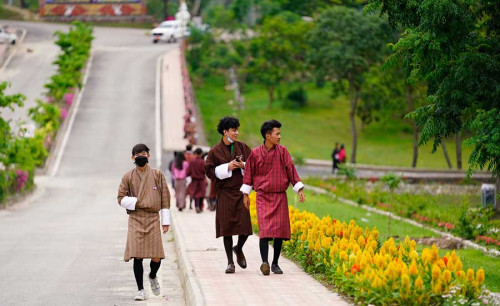
18th Jan, 2026
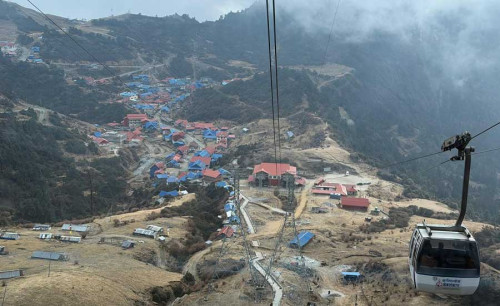
11th Jan, 2026
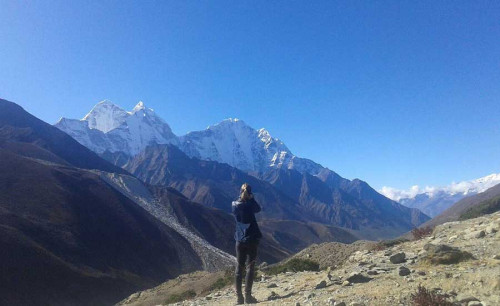
28th Dec, 2025
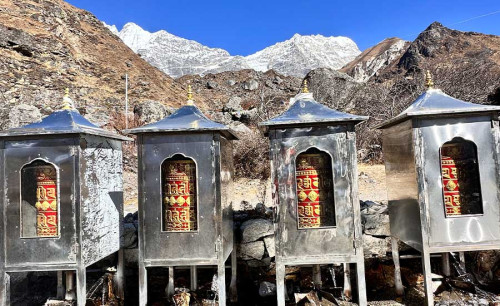
2nd Dec, 2025
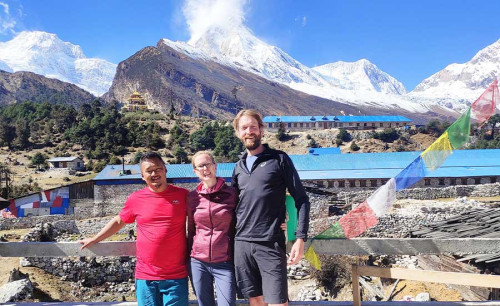
24th Nov, 2025
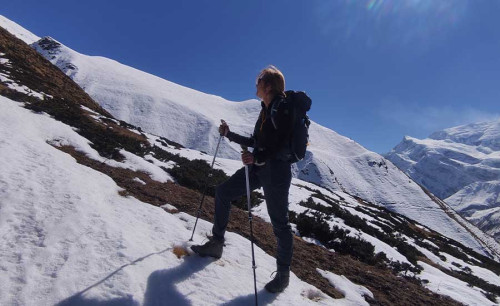
21st Nov, 2025
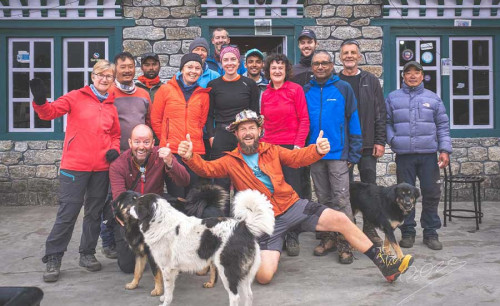
10th Nov, 2025
